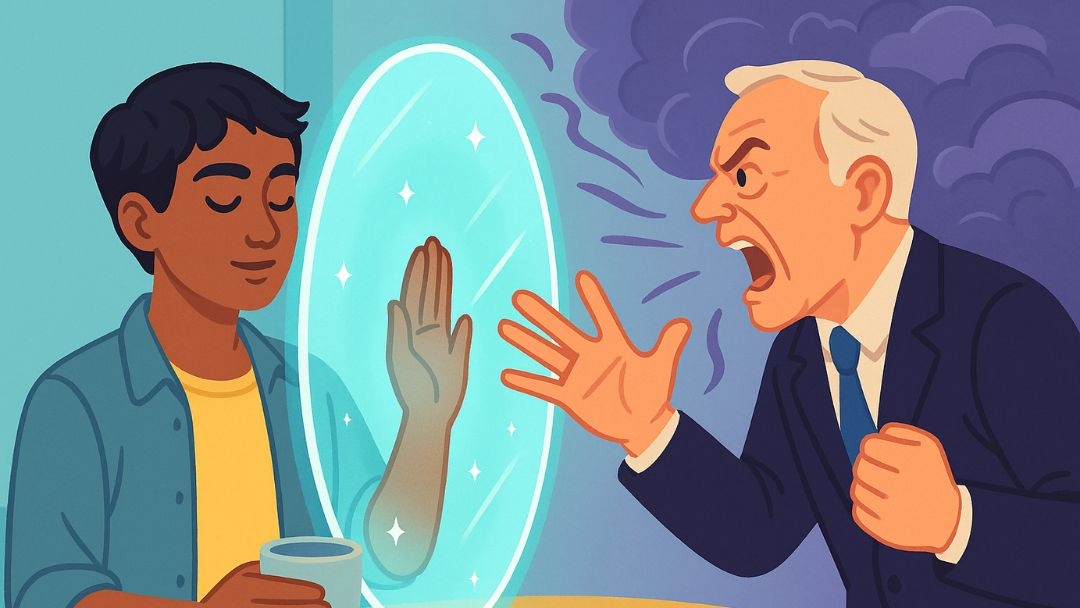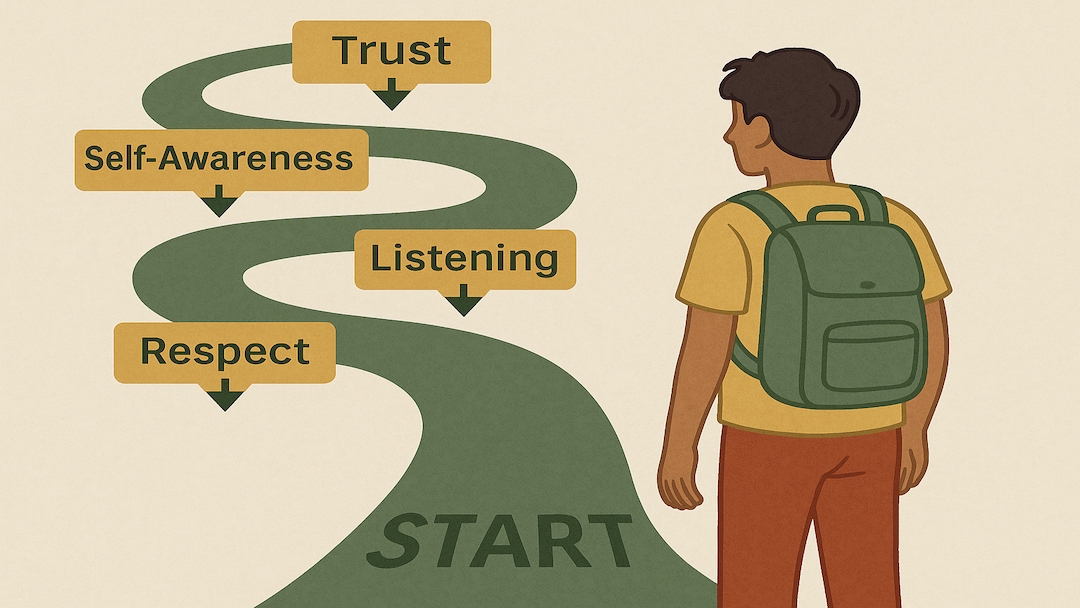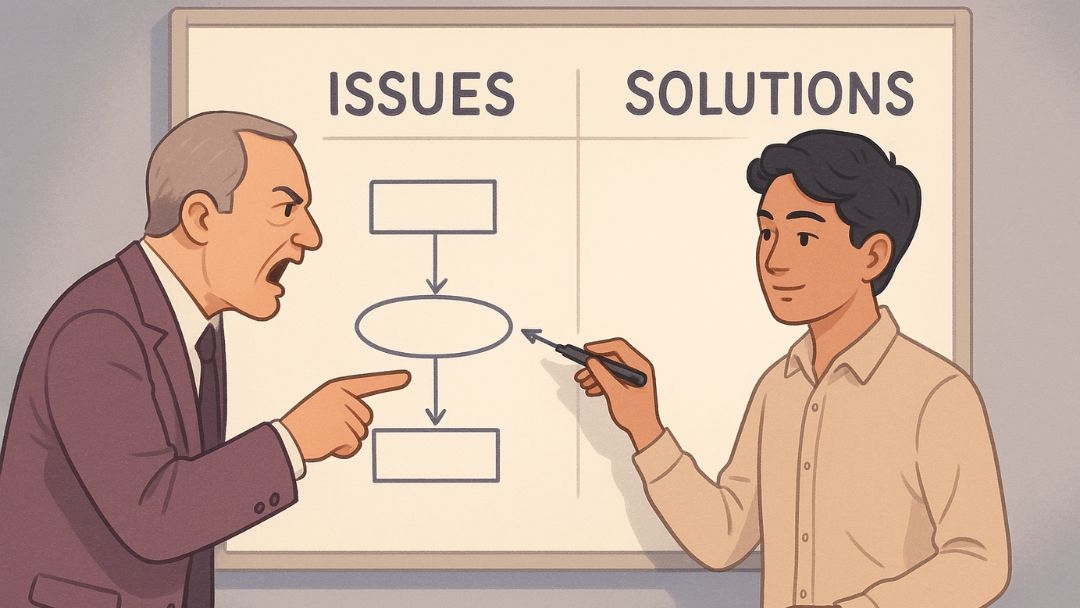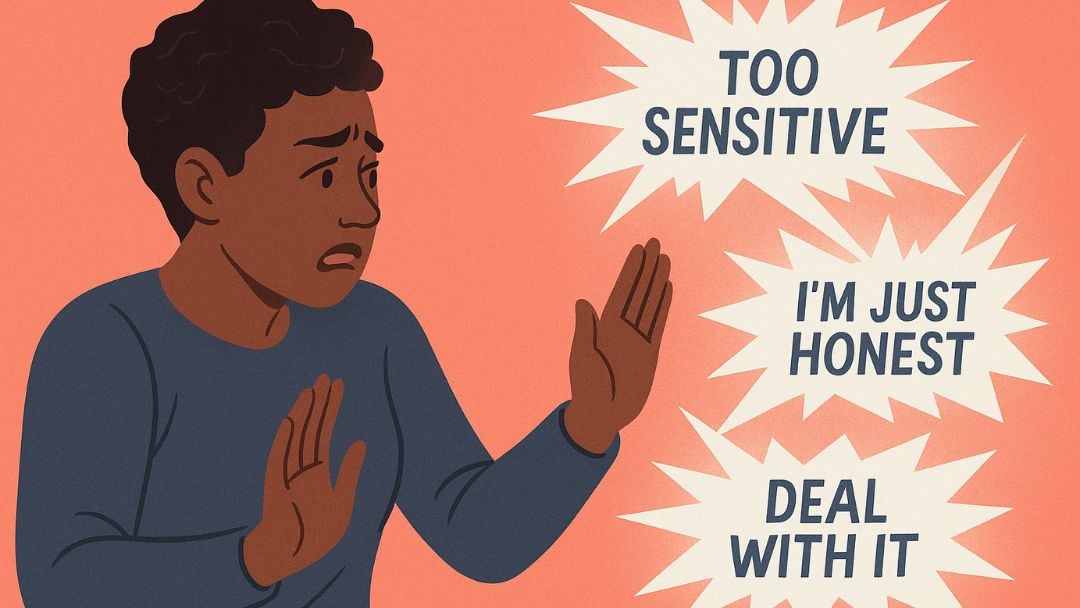Dealing with an Abrasive Personality: How to Handle Abrasive Behavior in Any Relationship
Dealing with an abrasive personality can be exhausting, especially when love, loyalty, or shared history keeps you tied to them. You care, but you're also tired of feeling belittled or constantly on edge. This guide breaks down how to navigate abrasive personalities in every kind of relationship—and what to do if you're the one being abrasive.


Back
8 mins read
I’ve had several run-ins with abrasive people, even before I knew the term “abrasive personality.” Back then, I just called them jerks (yes, I’m being polite). They were blunt, harsh, aggressive, and always one sentence away from offending someone.
If you’ve ever walked away from a conversation feeling bulldozed, chances are you’ve met one.
Maybe you work with one, answer to one, or live with one. Perhaps you are even one. I’ve seen abrasive personalities derail meetings, damage relationships, and poison work culture. Most aren’t self-aware enough to realize the damage they cause.
In many cases, that abrasiveness is more than just a quirk—it’s a toxic personality trait in disguise.
The best way to deal with an abrasive personality is to remain calm, address them directly and respectfully, set clear boundaries, and prioritize your peace.
But relationships are complex. What works with a rude co-worker may not work with a domineering parent. We’re going beyond generic advice and providing you with practical tips to handle abrasive behavior tailored to the specific relationship.
How to Deal with an Abrasive Personality Based on Your Relationship

An abrasive personality is a behavioral pattern marked by brutal honesty without tact or empathy, aggressiveness, bluntness, and insensitivity to others. In many cases, abrasive behavior stems from a poor upbringing, past trauma, low emotional intelligence, insecurity masked as confidence, or habits picked up in high-pressure environments.
Although abrasive personality disorder (AbPD) is not a medical diagnosis, its traits often mirror those in clinically recognized personality disorders, like narcissistic personality disorder or antisocial disorder, making it all the more important to address and manage in our relationships.
And just like narcissism, you don’t need a diagnosis to recognize the damaging traits, and feel their impact.
My experience dealing with abrasive individuals has taught me that there is no one-size-fits-all solution. Your strategy must make sense for their role in your life and yours in theirs. Let’s break down how to handle abrasive personalities in your professional and personal life.
When the Abrasive Person is Your Boss: How to Handle an Abrasive Manager
Because of the power dynamic involved, you’re always walking a tightrope with an abrasive boss. You’re constantly facing unnecessary jabs, snappy remarks, or harsh criticisms. You can’t exactly clap back or walk away when you have a toxic manager. But you also can’t keep absorbing their energy and expect to thrive. Here are practical steps to handle abrasive managers.
- Remain Professional: Stay calm and avoid copying their behavior. When they criticize, ask for specifics. Instead of “Why are you always on my case?” Try, “Can you clarify what I can do differently next time?”
- Set Emotional Boundaries: Learn to emotionally detach from their tone and focus on the helpful content.
- Document Key Conversations for Your Protection: Keep written records of detailed feedback, requests, or conflicts. After a direct conversation, send a follow-up email summarizing what was said.
- Ask for Constructive Feedback: Ask your manager, “I’d appreciate your feedback on the report. What’s one thing I did well and one area I can improve?”
- Aim to Perform, not Please: It’s futile to try to win over an abrasive boss. Focus on meeting clear expectations, achieving goals, and delivering results.
- Know When It’s Emotional Abuse: If your manager constantly belittles or gaslights you, no matter how well you perform, it could be emotional abuse. Document everything, speak to HR or a trusted superior, and start exploring exit strategies if necessary.
When the Abrasive Person is Your Co-Worker: How to Handle a Difficult Colleague
Working with an abrasive colleague is emotionally draining. You can’t ignore them forever—and suppressing your frustration only makes it worse. This is where communication, boundaries, and emotional intelligence become essential skills in the workplace.
Use these strategies to handle a difficult co-worker without losing your cool.
- Communicate Through Facts, Not Feelings: Prioritize problem-solving language. Instead of, “You’re always so rude during meetings.” Try this: “It’s more productive when we each have time to present before jumping in. Can we try that at the next meeting?”
- Limit Unnecessary Contact: Keep interactions concise, set clear boundaries, politely decline unnecessary chit-chat, and replace face-to-face meetings with messaging apps whenever possible.
- Know When to Escalate: If your co-worker’s behavior is interfering with your work, it’s time to bring the issue to your team lead, manager, or HR.
When the Abrasive Person is Your Subordinate: How to Handle an Abrasive Employee
Abrasive employees may be competent and capable—otherwise they likely wouldn’t still have their jobs—but those strengths don’t cancel out the damage they do to workplace culture. In fact, positive traits like confidence and sharpness can come off as arrogance or superiority when unchecked, making their behavior even harder to tolerate.
Here’s how to handle an abrasive subordinate.
- Address the Issue Privately: Tell them how their actions impact others. Say, “I noticed during the meeting you interrupted two team members. That shut down the conversation and made others afraid to contribute.”
- Set Clear Expectations for Communication: Make respectful communication a key performance metric. Say, “We value directness here, but it must be paired with respect. That includes tone, timing, and manner of speech during stressful situations.”
- Coach, Don’t Just Correct: Offer examples, role-play responses, or recommend development tools on communication and emotional intelligence at work. Tell them, “You’ve got strong ideas and a sharp mind. Let’s work on your delivery so your message lands well.”
- Use Written Agreements: Prepare an agreement that details an improvement plan with clear timelines and a follow-up review to evaluate the abrasive employee’s progress.
- Know When It’s a Deal Breaker: If all attempts to coach the subordinate fail, prioritize protecting the rest of the team. Involve HR and prepare to part ways.
When the Abrasive Person Is Your Partner: How to Handle an Insensitive Lover
When someone you love is abrasive, it’s easy to get caught between compassion and self-protection. Unlike a coworker or family member, a partner is someone you choose to keep in your life—or not. If you’re staying, it’s essential to protect your emotional well-being while encouraging healthier communication.
If you have an abrasive partner, here are practical ways to handle them.
- Hold Them Accountable: When they cross the line, address it. Not every incident requires a fight, but remaining silent sends a message that it is okay.
- Set Standards to Reject Disrespect: Let them know what’s not okay. Say, “I won’t stay in conversations where I’m being criticized harshly. Let’s pause and come back when we can speak respectfully.”
- Focus on Timing, Not Just Tone: Choose a time outside of conflict to raise the issues. Say, “Can we discuss our speech and body language during disagreements and uncomfortable situations? I want us to feel heard without tearing each other down.”
- Encourage Growth But Don’t Babysit It: Recommend couples counseling, emotional intelligence resources, or books to help your partner develop empathy and communicate more thoughtfully. But don’t make their growth your project.
Not all abrasive behavior comes from intentional harm. Sometimes, it’s a lack of self-awareness or emotional immaturity. For example, if your partner regularly says things like, “I didn’t mean it that way,” after hurtful comments, they may not fully understand how their words land.
But if these moments leave you questioning your reality, walking on eggshells, or feeling like the “problem,” it could be more than abrasiveness. Covert narcissism, gaslighting, and emotional abuse often wear a similar mask. If something feels off, trust yourself—and don’t hesitate to reach out for support.
When the Abrasive Person is Your Parent: How to Handle Overbearing Parents
When the person being abrasive is your parent, things get complicated. You might respect their good intentions—or feel guilty for pushing back. But no matter how much love is behind their words, harsh delivery still causes harm. Your job isn’t to change them—it’s to protect your peace.
Here are ways to handle an abrasive parent.
- Have an Honest Conversation with Them: Say, “I know you want the best for me, but the way you said that really hurt. I’m open to constructive criticism, but I need it to be respectful.”
- Learn to Redirect or Disengage: Abrasive parents love to win arguments. Learn to redirect or disengage from conversations heading nowhere. More importantly, avoid topics that can trigger conflict.
- Ground Yourself Before Responding: Responding in kind while tempers are flying can only worsen the situation. Pause, breathe, and respond with maturity.
- Choose Your Battles: Address the behavior that crosses the line or repeats often. But you can choose silence, a shrug, or a redirect for the small jabs or outdated opinions.
- Create Emotional Distance if Necessary: Limit how often and deeply you engage. You can love someone and still maintain your emotional boundaries.
- Seek Professional Help: Talk to a therapist, journal it out, or join support spaces for adult children of difficult parents.
When the Abrasive Person Is Your Friend: How to Handle Blunt Friends
Abrasive friends dominate conversations, offer unsolicited advice, and often joke at your expense. When you react, they call you overly sensitive or say you can’t take a joke. You hold on because of shared history, but you know something has to change.
Here’s how to handle abrasive friends.
- Watch the Pattern: Ask yourself, “Is this just playful banter or emotional abuse disguised as friendship?” A good friend shouldn’t attack or belittle you constantly.
- Stop Letting Their Insults Slide: Laughing off their comments to keep the peace only reinforces the behavior. Reiterate that you won’t tolerate their hurtful comments.
- Be Direct: Abrasive friends respond to directness but often miss subtle cues. Say, “I value our friendship, but sometimes you speak harshly. I want to stay close, but I need conversations that feel safe.”
- Redefine or End Friendship: Limit your contact to group settings and move from daily check-ins to occasional meet-ups. If the friendship becomes toxic, walk away to avoid the negative consequences.
What If I’m The Abrasive One? 11 Signs and Common Traits of Abrasive People

It’s not always easy to admit, but sometimes you’re the difficult one in the room. Due to your distorted self-perception and poor self-awareness, you tell yourself you’re just being honest in a world that sugarcoats too much. However, if you’re a major reason people pull away or get defensive, you should reevaluate your behavior and communication style.
Because abrasive people tend to be professionally successful, you overestimate your own abilities, believing your recognized expertise in a particular area gives you the license to dominate conversations and override others. Here are common signs to know if you have an abrasive personality:
- You dominate discussions or interrupt people mid-sentence.
- You rarely sugarcoat anything, even when it stings.
- You’re often frustrated that others can’t handle the truth.
- You have little patience for emotions, weakness, or sensitivity.
- You play the victim and struggle to admit when you’re wrong.
- You don’t mind stepping on others to get ahead.
- You view most conflicts as opportunities to win.
- You think you’re above everyone else and accepted norms shouldn’t apply to you.
- You often come across as confrontational, even when trying to help.
- You downplay others’ feelings or struggles.
- You are controlling, bossy, and highly critical of others.
How to Fix My Abrasive Behavior: 7 Practical Steps to Be Less Abrasive

Being abrasive is a behavior pattern that can be changed if you’re willing to do the work. Here are 7 practical steps to fix your abrasive personality.
- Take Feedback Seriously: Start with self-recognition. How does your action affect others? When someone calls you out, ask yourself: Is there truth in what they’re saying? You don’t have to agree with every word. But you should be concerned if most people you encounter say the same thing.
- Pause and Filter Before You Speak: Before you say the wrong thing or say it the wrong way, pause and filter. A split second of self-control can save a relationship. Before you respond, ask: Is this helpful, kind, or necessary?
- Choose Impact Over Intention: Focus less on what you meant and more on how it landed. If people consistently feel hurt, dismissed, or steamrolled by you, your delivery needs work.
- Practice Listening: Sometimes, people just want to be heard, not corrected, coached, or argued with. Just listen. No advice, rebuttal, or “well actually.”
- Work on Emotional Intelligence: Read the room. Pay attention to the tone, body language, and unspoken cues.
- Learn to Apologize without Excuses: Own your mistakes without trying to minimize, defend, or blame them on others’ attitudes. Say, “I could have said that better. I’m sorry.”
- Be Consistent: Change won’t happen overnight. Keep showing up differently by speaking mindfully, listening carefully, and taking accountability when you fall short. People will notice and begin to trust you again.
Whether It’s in You or Around You, Abrasive Behavior Must Be Addressed

No one enjoys uncomfortable conversations, but letting abrasive behavior slide creates a bigger mess later. Before you know it, you’re either walking on eggshells or pushing people away without realizing it.
If you value your peace, relationships, and growth, you’ll do the work. That means calling out disrespect, having awkward but necessary conversations, and being honest with yourself when you’re the one causing friction.
Whether it’s in you or around you, abrasive behavior, like any other negative trait, only changes when someone stops pretending it’s fine.


Return to Blog







